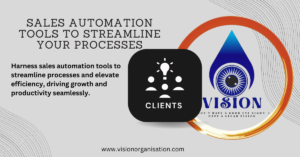Sales Automation Tools to Streamline Your Processes: Introduction –
Sales Automation: Supercharge Your Sales Pipeline in the Age of Efficiency
The world of sales is undergoing a digital transformation. Gone are the days of tedious manual tasks and an overreliance on intuition. Today, sales automation tools are empowering businesses to streamline processes, boost productivity, and close more deals.
Why Automate Your Sales Process?
Increased Efficiency: Sales automation frees up your team’s valuable time by handling repetitive tasks like data entry, scheduling meetings, and sending follow-up emails. By automating repetitive tasks, sales reps can shift their focus to the strategic aspects of the sales process, like nurturing relationships and securing deals.
Improved Data Accuracy and Management: Enhanced Data Accuracy: Automation eliminates the risk of human error inherent in manual data entry. Sales automation tools ensure accurate data capture and streamline CRM management, providing a clear picture of your sales pipeline and customer interactions.
Enhanced Lead Generation and Qualification: Automation empowers you to identify and nurture high-quality leads more effectively. Tools can automate lead scoring, email outreach, and qualification processes, ensuring you target the right prospects at the right time.
Personalized Customer Interactions: Automation doesn’t have to be impersonal. Sales automation tools can help you personalize outreach efforts by automating email sequences and tasks based on customer behavior and interests.
Data-Driven Decision Making: Sales automation tools provide valuable insights and analytics. These insights empower you to identify sales trends, optimize your sales strategy, and make data-driven decisions for maximum impact.
Exploring the Sales Automation Toolkit
Customer Relationship Management (CRM) Software: The cornerstone of any sales automation strategy, a CRM centralizes customer data, streamlines communication, and tracks the sales pipeline.
Lead Generation and Qualification Tools: These tools automate lead capture, scoring, and qualification processes, ensuring you focus on high-potential leads with the greatest chance of conversion.
Email Marketing Automation: Craft personalized email sequences, automate follow-ups, and nurture leads with targeted email campaigns that drive engagement and conversions.
Sales Engagement Platforms: These tools manage communication across various channels (email, social media, phone), automate tasks, and provide real-time insights to improve sales rep outreach and engagement.
Sales Analytics and Reporting Tools: Gain valuable insights into sales performance, identify trends, and optimize your strategy with data-driven sales analytics and reporting tools.
Implementing Sales Automation for Success
Identify Your Needs: Assess your current sales processes and pinpoint areas where automation can generate the most significant impact.
Choose the Right Tools: Research and carefully select tools that align with your specific needs, budget, and team size.
Integrate with Your CRM: Ensure seamless integration between your chosen automation tools and your CRM to maintain data consistency and avoid silos.
Train Your Team: Provide comprehensive training to equip your sales team with the knowledge and skills to leverage the new tools effectively. Sales Automation Tools .
Monitor and Refine: Track the impact of your automation efforts and continuously refine your approach based on data and user feedback. Sales Automation Tools .
The Future of Sales Automation: An Intelligent Sales Machine
Personalize Sales Conversations: AI-powered chatbots can handle initial interactions, qualify leads, and personalize conversations based on customer behavior and sentiment.
Predictive Analytics: Advanced analytics will predict customer needs and buying behavior, allowing sales teams to tailor their approach for maximum impact.
Automated Sales Coaching: AI can analyze sales interactions and provide real-time coaching to reps, helping them close deals faster and more effectively. Sales Automation Tools .
By embracing sales automation and staying ahead of the curve, you can empower your sales team to thrive in today’s dynamic marketplace. Remember, automation is not a replacement for human connection; it’s a powerful tool that frees up your team to focus on building relationships and closing deals, ultimately propelling your business towards sustainable sales success.

Conclusion: Sales automation tools are revolutionizing the sales landscape. By automating repetitive tasks, these tools empower sales teams to become more efficient, data-driven, and effective. From improved lead generation to personalized customer interactions and data-backed decision-making, sales automation offers a treasure trove of benefits. With the integration of AI and machine learning, the future of sales automation promises even smarter tools for personalized conversations, predictive analytics, and automated sales coaching. By embracing automation, businesses can equip their sales teams to thrive in today’s competitive market and achieve sustainable sales success. However, it’s crucial to remember that automation is a tool to enhance human connection, not replace it.

